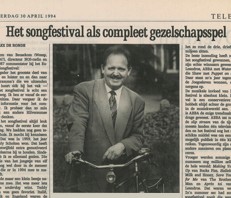
Organizational Hassles The NPS presented itself as a fully-fledged broadcasting company where programming played a central role. 'There's way too much discussion about the organization. And yes, I'm a part of those discussions, but it's all about the programming, or at least that's what it ought to be about. Programme makers should be faced with as few organizational hassles as possible – I'm certainly one to champion this cause.' This instrumental role almost seemed to deal a fatal blow to the NPS in a new political discussion about public broadcasting. At the end of 2005, just days after celebrating its ten-year anniversary, the Minister for Education, Cultural Affairs and Science announced government plans to discontinue the NPS. In a brief, to-the-point statement, it was announced that it was
programming that mattered and not the
organization. For Willem van Beusekom, this came as a quite a shock for the
most publicly minded broadcasting company within the Dutch public broadcasting system. However, it suddenly appeared that the NPS had unexpectedly strong support at a grassroots level. Almost 100,000 viewers and listeners signed a petition protesting the plan, and both friends and foes of the public broadcasting company alike joined ranks to decry the move as
incomprehensible and
utterly absurd, expressing their outrage during a well-attended protest in The Hague. The government coalition continued to act as though it were entrenched in the stance that it had taken. Almost a year later, the political tide seemed to turn, but that did not dispel doubts altogether.



